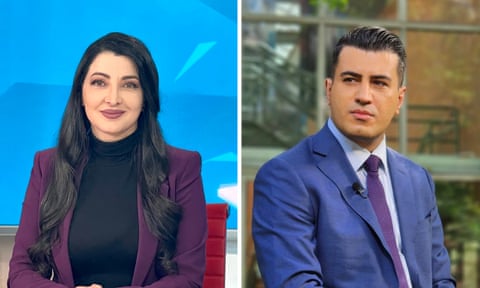theguardian – A journalist at the centre of an Iranian plot to kill two UK-based TV presenters has said sanctions won’t stop Iran from targeting people on UK soil.

A journalist at the centre of an Iranian plot to kill two UK-based TV presenters has said sanctions won’t stop Iran from targeting people on UK soil.
The UK and US governments sanctioned Iranian officials with travel bans and an asset freeze yesterday over the targeting of Sima Sabet and Fardad Farahzad, who worked for the TV news station Iran International based in London.
The plot to kill the two presenters was just one of at least 15 credible threats to kill or kidnap British nationals and others living in the UK since the beginning of 2022, according to UK officials.
Iran is increasingly targeting people outside its borders in a tactic known as transnational repression, which aims to stifle debate or criticism.
BBC staff in London have told the Guardian that they fear walking outside alone after being harassed by the Iranian authorities, after allegedly being warned: “We can do whatever we want in London.”
Britain’s foreign secretary, David Cameron, said the joint UK and US sanctions on members of Iran-linked criminal gangs and the Islamic Revolutionary Guard Corps (IRGC), a branch of the Iranian state’s armed forces, would “send a clear message – we will not tolerate this threat”.
But Sabet said more meaningful action was needed by the international community than sanctions on individuals.
“The Islamic Republic suppresses people inside, and also those critical of the regime outside, adding to instability and tensions in other countries. It won’t change its behaviour unless it feels the pressure,” said Sabet, who called for more support for opposition to the regime and a minimising of diplomatic relations.Quick Guide
Transnational repression
Farahzad, who relocated to Washington DC before the plot could be carried out, said it had been “alarming to witness the lengths to which the Iranian government is willing to go to silence journalists and suppress freedom of expression. Such actions are a stark reminder of the challenges and dangers that journalists face, particularly when reporting on issues that are critical or sensitive to authoritarian regimes.”
Among those sanctioned by the US and UK is Naji Ibrahim Sharifi-Zindashti, named as the head of an international drug and trafficking cartel, who has also been indicted in the US for plotting to assassinate two residents of the state of Maryland. His alleged co-conspirators, both Canadian nationals, are in detention in Canada on unrelated offences.
Matthew G Olsen, assistant attorney general of the US Justice Department’s national security division, said: “To those in Iran who plot murders on US soil and the criminal actors who work with them, let today’s charges send a clear message: the Department of Justice will pursue you as long as it takes – and wherever you are – and deliver justice.”
Human rights activists said rather than sanctions on individuals, the UK needed to proscribe the IRGC as a terrorist organisation.
“They [Iran] are aware we [the UK] are doing all this in order to not proscribe IRGC,” said British-Iranian activist and former political prisoner Vahid Beheshti. “At this point we are encouraging them to continue assassinations and terrorist activities, brainwashing our youth and creating a sleeping cell. We are somehow encouraging them instead of stopping them, by not holding them accountable.”
The UK and US governments sanctioned Iranian officials with travel bans and an asset freeze yesterday over the targeting of Sima Sabet and Fardad Farahzad, who worked for the TV news station Iran International based in London.
The plot to kill the two presenters was just one of at least 15 credible threats to kill or kidnap British nationals and others living in the UK since the beginning of 2022, according to UK officials.
Iran is increasingly targeting people outside its borders in a tactic known as transnational repression, which aims to stifle debate or criticism.
BBC staff in London have told the Guardian that they fear walking outside alone after being harassed by the Iranian authorities, after allegedly being warned: “We can do whatever we want in London.”
Britain’s foreign secretary, David Cameron, said the joint UK and US sanctions on members of Iran-linked criminal gangs and the Islamic Revolutionary Guard Corps (IRGC), a branch of the Iranian state’s armed forces, would “send a clear message – we will not tolerate this threat”.
But Sabet said more meaningful action was needed by the international community than sanctions on individuals.
“The Islamic Republic suppresses people inside, and also those critical of the regime outside, adding to instability and tensions in other countries. It won’t change its behaviour unless it feels the pressure,” said Sabet, who called for more support for opposition to the regime and a minimising of diplomatic relations.
 Shabtabnews In this dark night, I have lost my way – Arise from a corner, oh you the star of guidance.
Shabtabnews In this dark night, I have lost my way – Arise from a corner, oh you the star of guidance.



